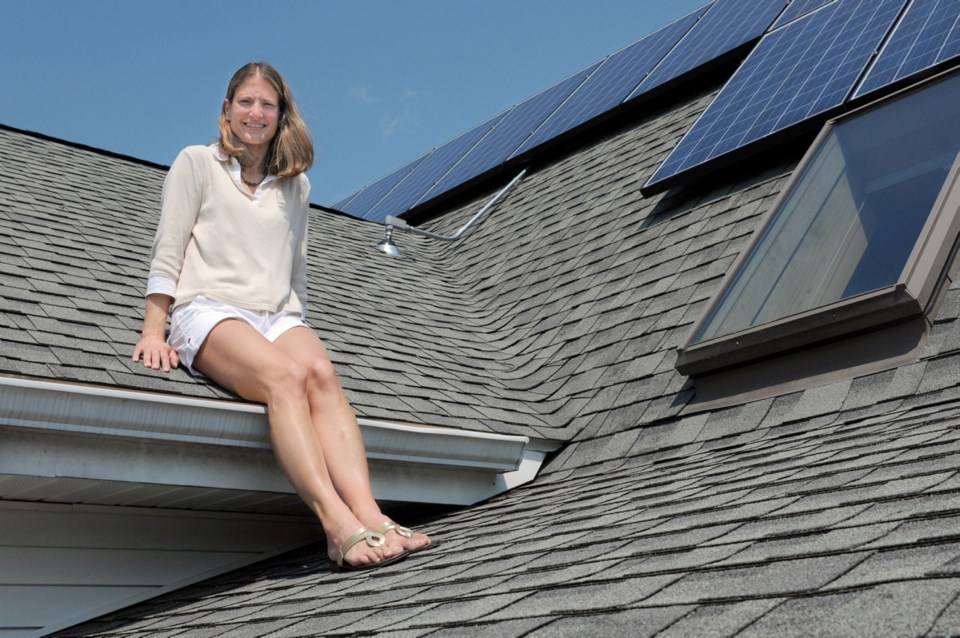Erika Schweickert of Capital City Solar in Rocklin, Calif., has seen a surge the past couple of years in customers interested in investing in solar-energy systems for their homes.
They’re not investing thousands of dollars into solar systems because it’s chic to be green; they’re doing it because it makes good financial sense.
A solar-energy system can significantly reduce — and in some cases eliminate — your monthly electric bills. Photovoltaic solar systems work by converting sunlight that hits solar panels on the roof directly into electricity through an inverter attached to the house.
“Some people do it to be green, but 90 per cent of our customers are doing it because of the financial payback,” Schweickert said. “They see the greater return on investment in putting their money in solar than they do in putting it in the stock market or something. You can be green and also make a wise investment.”
Kent Crook has spent 30 years working as an electrician as the owner of Wiremasters Electric Inc. in Miami, but for the past five years, he has built a business as Mr-Solar LLC. He’s sold on solar as a solution to our dependence on fossil fuels.
“It’s going to change the way we live,” Crook said. “We’ve got to do something with foreign fuel, with the carbon we put in the air. I feel solar is not the [only] solution, but it’s one of the solutions to help with these things.”
Solar systems have become much more affordable in recent years. Photovoltaic prices are determined by watts, with the average about $3 a watt, nearly half of what it was in 2010. Add to that a 30 per cent federal tax credit in the U.S. available for residential solar-panel installation good through 2016, plus a variety of rebates and incentives offered from local utilities, and it makes the investment significantly less. Systems can range in price from a few thousand dollars to $50,000 before credits, incentives and rebates kick in, depending on the manufacturer and how many panels are installed.
“There’s not a better time than now to put it in,” Crook said.
In most states, homeowners with solar photovoltaic systems can sell back extra energy they don’t use to their local utility companies. Called “net metering,” customers earn credits for excess solar energy sent to the utility provider’s electrical grid from their house. An Indianapolis couple said that their bills averaged about $20 a month after adding panels to their home. With the cost of electricity only rising — Schweickert said California rates are increasing by six per cent annually — investing in solar panels now is a way of investing in the future.
“Solar kind of hedges against those future rate increases,” Schweickert said. “In California, electricity is really pricey, so we really try to get our customers out of those high tiers that tend to go up substantially. We call that ‘tier-shaving.’ All utilities are a little bit different. We have some customers that eliminate their bills completely on an annual basis.”
The number of panels a homeowner needs depends on their energy consumption and the amount of daylight the home receives. Ideally, panels should be installed on the south-facing side of the house.
Panels require minimal maintenance. Schweickert recommends an annual cleaning and inspection. Most panels have 25-year warranties and are designed to last at least that long.
If you’re thinking about adding a solar system, be sure to research the products and installers before you invest. One reason prices have fallen is because of a glut of manufacturers producing the products. Both Schweickert and Crook said quality of the panels can vary greatly, as can the quality of the installer.
“Make sure you go with a company that has a licensed electrician on staff and that has a good amount of solar installations under their belt,” Schweickert said. “We see in our area companies that do HVAC, or windows and doors, or roofers, that now also do solar. It’s a whole industry in itself. Just make sure they have a level of experience behind them.”



